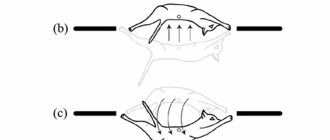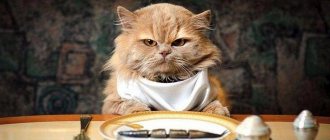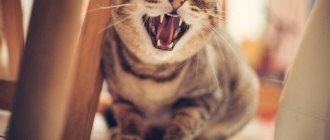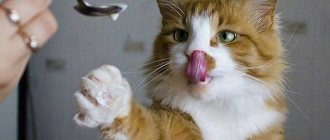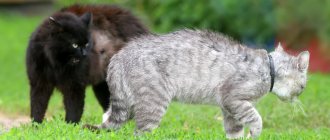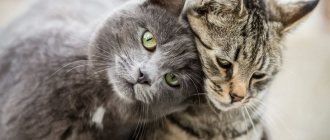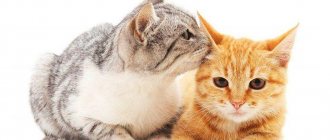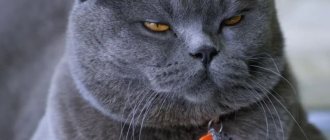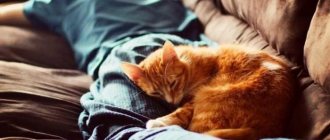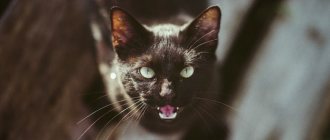Many cat owners find that their cat is always asking for food even if it is fed the right amount throughout the day, and there could be several reasons why they do this. This behavior, or rather a condition known as polyphagia, can be frustrating for the owner because, frankly, it's not a natural behavior when you think about cats in the wild: they hunt, eat, clean, then sleep and start all over again.
They don't constantly hunt for food, so why all the begging? In this article, we'll look at all the possible reasons why your cat is always begging for food, even when she's finished eating, and sometimes even when there's still food in her bowl.
Asks for food when there is food in his bowl
One of the reasons why a cat may beg for food when there is still food in their bowl could be because they feel that it is no longer fresh, this is due to the fact that in the wild they eat fresh prey, and, if your food sits in a bowl for a long time, he may simply find it not fresh now.
Having said that, try stirring him a little with your finger, shaking the bowl so he thinks there is more fresh food now. Moreover, if you remove the bowl after the cat has eaten, this may help, and then when she begs for food again, you can only offer her uneaten food if it is dry food.
© shutterstock
Another reason why a cat may beg for food even if its bowl is half full may be due to its whiskers. If you have a deep food bowl, when the cat gets down to a certain depth, his whiskers may start to touch the sides of the bowl or the food, causing the cat to stop eating. Additionally, a cat taking medication for a medical condition may develop polyphagia. It sounds stupid, but he may just be uncomfortable eating when his whiskers are touching something, to fix this, try giving him a shallow bowl but a larger diameter, sometimes something as trivial as this may work.
Pussy is bored
Just like people, some cats transmit because they are bored. The solution to this problem is to provide your cat with more entertainment and active play, and to stop leaving his food freely available. If you have to leave food freely available to your pet, put it in a puzzle toy that will force your kitty to work hard to get it out. This will help your pet burn calories and take his mind off the process of eating food. Be sure to play with your pet (maybe even get another kitten as a playmate) to distract him from food. You can also buy automatic food dispensers that provide access to a set amount of food at a given time of day.
Asks for food when there is no food in the bowl, but it has already been eaten
A cat asking for food if its food bowl is empty could simply be because it hasn't had enough, although this is probably unlikely so we need to look at other possibilities and it could be behavioral or even medical.
First of all, it's easy to forget that he's growing if he hasn't already, so you may want to just double-check the amount listed for your cat's weight and age because he might just be starving. Once you have ruled this out, make sure you space out his meals at regular intervals as some owners who work odd hours may feed their cat when it suits them, the problem is that this may not be suitable for your cat .
Sometimes there is an underlying reason why your cat is constantly asking for food, and one of those reasons may be inactivity. If your cat doesn't get much activity during the day, she may become a little lazy, leading to begging, which in turn can lead to obesity and other health problems. It is recommended to make meal times fun, try playing with him ten minutes before each meal, this may have the effect of hunting in the wild as they release a lot of energy when chasing and hunting prey and he may be less prone to begging after eating.
Feeding principles
Disorderly eating will not benefit the animal. Therefore, you should adhere to certain rules:
- You should not offer cats dog food that has a completely unsuitable composition for them. The result may be a deficiency of essential minerals and vitamins.
- Food from the table is possible only occasionally; it should serve as a supplement to the regular diet. Fluffies happily eat offal, fish, vegetables, and dairy products, but they should be given in strictly limited quantities.
- Pets should not be placed on an exclusively meat diet.
- Raw meat and fish, as well as unboiled fresh milk, should be prohibited. Their consumption will lead to the appearance of worms or an intestinal infection.
- High quality cat food contains all the necessary ingredients, there is no need for vitamin supplements.
- Food should be at room temperature. If your pet eats food from the refrigerator, it is poorly digested.
Important! Be sure to have a bowl of fresh water next to the food. Prepared food in bags has sufficient moisture, and pelleted food causes a constant need for water.
Health status
In most cases, cats that constantly beg for food have an underlying medical condition, and in many cases it may simply be a medical condition. One common condition that makes a cat seem hungry all the time is worms, and while none of us want to admit that our cat might have this condition, it is more common than you think, but it is treatable.
Worms can be acquired from a variety of places, especially if your cat likes to play outdoors or spend the night. However, your veterinarian can quickly determine if he has worms, and this is a relatively easy-to-treat and affordable process, usually in the form of oral medications.
© shutterstock
Feline diabetes may be another cause of increased appetite, scientifically known as diabetes mellitus, when the cat's body does not use insulin correctly or does not produce enough insulin. Diabetes can be identified, again by a veterinarian, through blood tests and a physical examination with laboratory tests, and can be treated.
Signs you may want to look out for as an owner may include excessive urination, excessive drinking of water, and constant begging, in which case you should make an appointment with your veterinarian as soon as possible. Moreover, you may find that even if your cat eats very well, she may be losing weight, which is another sign of diabetes.
Other health conditions that can lead to polyphagia can be acromegaly, which is an excess of growth hormone, usually resulting from a pituitary tumor, Cushing's syndrome, hyperthyroidism, inflammatory bowel disease, and even pregnancy in cats.
Almost all health conditions can be cured or managed thanks to advances in medicine, and your veterinarian can be your best friend in finding the cause of polyphagia in your cat. Your cat constantly asking for food may seem natural at first glance, but in reality there is always a reason for something unnatural, and it could be something as simple as a behavior you learned early on.
When to start sounding the alarm?
The cat constantly feels a feeling of hunger and during the development of dangerous syndromes and diseases. One of the main dangerous reasons is impaired absorption of nutrients. This may be a congenital syndrome or a sign of a serious illness:
- inflammatory process in the intestines;
- bowel cancer;
- exocrine insufficiency.
With these diseases, poor absorption of food occurs and the feeling of hunger increases. The animal suddenly loses weight.
Why does a cat eat a lot and not get enough?
Return to Care and feeding This forum is currently viewed by: no registered users and guests: 0
Consult with experts and choose food suitable for your cat.
Itching and parasites
The cat licks areas of the body where it is itchy or painful. Licking in the anal area can be caused by constipation. Sick areas are licked more “targeted” than itchy areas. In case of itching, the licking area exceeds the size of the itchy area. The appearance of bald patches provides clues to the cause of excessive licking of fur.
Skin wounds
Cats lick scratches and other skin lesions. This is a normal process that cleanses the wound. In nature, a cat has no other way to take care of itself. However, this may be undesirable when the wound is treated with some kind of ointment or a suture is applied. To prevent unnecessary licking, you should limit your cat's access to the affected area.
Cats really don’t like closed doors, where they used to go freely. The cat is worried, not knowing what is happening in the closed (its!) territory. Additionally, while cats can get by with a small living space, it shouldn't be too small. Perhaps any of us would begin to tear our hair out, being locked in an apartment for years 24 x 7. We consult with family members when making any decisions. And although we cannot consult with a cat, we are quite capable of taking its interests into account.
Excessive licking is not always associated with a cat's physical health. Its cause may also have a psychological basis. Cats like their lives to be predictable and orderly, so unexpected changes can be stressful, says Dr. Perry. Reconstruction of the apartment, the appearance or disappearance of other animals, and sometimes even a change in regime cause anxiety in cats.
It happens that people try to force a cat to live by their own rules and do what they see fit. Such tricks do not work with cats - she is a free animal (conditionally domestic), she cannot be defeated, you can only come to an agreement. It is necessary to take into account her interests, creating as many opportunities for the cat as possible to satisfy her natural needs.
Licking in such cases is considered “replacement behavior” (people in such cases behave similarly, for example, biting their nails) - it calms the cat, but at the same time can become habitual if the source of anxiety is not noticed and eliminated in time.
If all medical problems are resolved, then treatment for excessive licking as a result of some form of stress in the cat's life is necessary, says Dr. Perry. If possible, changes should occur gradually, while maintaining elements of the environment familiar to the cat. For example, when moving, you need to take the cat house with you.
We suggest you read: How to treat a cat with herpes on his lip. Herpes is the main respiratory disease of cats
Provide elevated platforms that cats love - they make the cat feel safe and are perceived as possible escape routes. Help your cat show its hunting instincts by playing with it for just 10-15 minutes a day. Most cats love to be played with.
In addition, licking gives cats some pleasure. Thus, excessive licking can become a habit that continues after the cause is identified and addressed. Typically, a cat's fur licking returns to normal (on its own or after assistance) within a month.
With both physiological and mental causes of licking problems, resolving them takes time and patience. With proper attention and care, the cat's fur is restored and life returns to normal.
What to do if your cat starts eating a lot
Now let’s look at what to do if an animal is overly hungry.
If your pet begins to ask to eat more often, and the amount of food eaten has become larger, then first of all you should pay attention to the balance of the food. Perhaps it's time to change the food to something more nutritious. But you don’t need to get carried away and give your cat food in excess of the norm.
It is also necessary to exclude all possible pathologies described above, and carry out treatment for fleas and worms.
Young and growing animals can be fed more than usual
Since cats love to eat delicious food, it is important for the owner to feed the pet in such a way that its body replenishes energy in a timely and efficient manner. Then it will be easier to understand when the cat gets sick and his eating behavior changes.
The normal weight of a cat is between 3.5 and 5 kg. It all depends on the breed. Cats of different origins differ in activity, dynamics and metabolism. In adulthood, the individual reaches 7-8 kg. You can find out why a cat doesn’t get fat if you understand how nutrition affects your pet’s body.
When a cat is thin and does not gain weight, but eats a lot, this does not mean that the pet is sick. If an animal spends its days running and jumping around the apartment or on the street, losing weight and not gaining weight becomes a good sign. The body consumes the energy received from food, the digestive system develops and functions in a stable manner.
Other reasons for losing weight include:
- A cat cannot gain weight after giving birth . If there are more than 2 kittens in the litter, you should not count on rapid weight restoration. Carrying out such a brood takes a lot of effort and energy. Therefore, mother cats will need time.
- Males begin to lose weight during the period of sexual heat, as do females . In spring, the body of cats and dogs is especially active. Castration will help: sterilized cats simply have nothing to do, so such animals gain weight instantly.
- Pets are not adapted to stressful situations and therefore do not gain weight . Street cats are constantly under threat. An uninvited guest, a new pet in the apartment, or even a newborn baby can shock a furry animal. Refusal to eat is a natural reaction.
- If the cat eats well and does not get better, the problem may be a helminthic infestation . Helminths enter the body through the dirty hands of the owners, an unwashed tray, and dirty water. It is better to start treatment immediately: the period of getting rid of worms can last up to six months.
- It is useless to feed old cats heavily . With age, the activity of females and males decreases. Cats spend more and more time lying down and moving little. This does not indicate illness: the cat will not eat more than the body needs.
- Vitamin deficiency leads to weight loss . Industrial feed will correct the situation. Artificial formulations (available in dry and liquid forms) contain mineral supplements and restore the balance of beneficial components in the body.
What a kitten's meowing could mean: 6 reasons
All domestic cats in the world speak the same language. In some situations, the cat's voice brings tenderness, in others it irritates. A kitten doesn't just meow. He gives his voice when he wants to communicate, ask or demand something.
Among the reasons that make a cat meow are the following:
- Adaptation to new living conditions. A kitten adapts to coexistence with a person when its mother teaches it. Personality is fully formed when the cub spends up to 100 days of age interacting with its mother and littermates. Even in this case, it takes 2-3 days to get used to the new conditions. When a baby appears in the house, during the daytime he feels increased attention to himself and explores new places. But when night comes and everyone falls asleep, the kitten experiences stress and remembers its mother. He tries to find her and calls her all the time.
- The cat is a solitary night hunter. The biological clock is set for daytime sleep and nighttime activity. If the owners do nothing to coordinate the cat’s life rhythm with theirs, sleepless nights await them.
- The animal slept in the evening, he is bored and wants to play.
- Hunger.
- The animal felt that family members treated him differently. Some household members allow him something, others prohibit him. If there is a row in the family, the pet tries to take advantage of the situation and take a higher place in the hierarchy of the pride.
- The kitten is sick and asks for help.
Be sure to read: Cat tangles, what they are + video on how to get rid of hair that has gotten into a ball.
The owner of a kitten needs to learn to understand the language the pet speaks. Act strictly but fairly in order to gain the authority of the dominant individual in the human-cat family.
How to properly feed a cat natural food?
The menu consists of two types of dishes. These are meat and dairy products.
The basis of the meat diet is lean beef, cut into small pieces. Next you need to provide the dish with vitamins. This can be done with the help of vegetables or special additives. Veterinary stores sell vitamin powders that contain everything your pet needs. The compositions are not cheap, but it saves the housewife time.
The fermented milk set consists of low-fat cottage cheese and one percent kefir. On average, cottage cheese is served “on the table” to the cat 1-2 times a week.
How often to feed
Babies eat more often than adult animals.
Usually food is given five times a day. Conventionally, the regimen can be divided into breakfast, snack, lunch, second snack and dinner. Portions for kittens should be small. If you plan to feed wet food, after eight months of life, switch your pet to three meals a day. At ten months, the cat can be accustomed to two meals a day. Apply the prescribed portion at a certain time. It’s better not to lay out the daily amount right away, so that the food doesn’t dry out or turn sour.
Dry food is poured throughout the day in accordance with the calculation table on the package. Foods differ in caloric content, so some manufacturers recommend giving a cat 50 g of food per day, while others recommend 60 g. A cat, as a rule, does not eat everything at once. During the day, the animal can approach the bowl up to 20 times. Cats rarely overeat, but neutered pets often have an increased appetite. Therefore, it is better to maintain a balance between the volume of the portion and the weight of the animal, and not pour it “by eye.”
For any meal, filtered water at room temperature should be placed next to the bowl. It should be changed twice a day.
What conditions affect nutrition?
The regimen, volume of portions, and variety depend not only on the age of the pet.
It is important to take into account the degree of fatness and special periods of life - pregnancy, lactation, rehabilitation after operations. Don't forget about the time of year and the cat's mobility. In hot weather, your pet loses its appetite, eats less and drinks more. With an active lifestyle, he requires a significant amount of calories. When an animal lies motionless for almost the whole day after an illness, there is a risk of overfeeding the pet. If your pet suffers from chronic diseases, it needs a special diet. In all special cases, consult your veterinarian. The doctor will help you create the right diet and regimen.
How to determine how much feed you need
Pet cats are more likely to overeat than undereat.
If you choose the lesser of evils, then the first is better. After fasting for a couple of days, the animal can become seriously ill. Obesity can be fought. Of course, it is better not to allow either one or the other. Control the amount of food based on the animal's behavior. If the cat eats everything without a trace, licks the bowl for a long time and looks for something else to snack on, increase the portion and watch again. Or give food more often, but in small portions. If the cat, on the contrary, leaves some of the food, reduce the portion.
